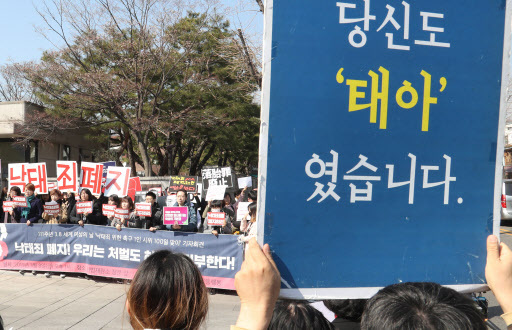The Constitutional Court is set to rule on the validity of the current abortion ban Thursday for the second time in seven years, amid a growing feminist movement and public support for scrapping the law.
 |
Women's rights activists and pro-life activists hold rallies to voice their demands in front of the Constitutional Court.(Yonhap) |
Since a court deadlock de facto found the abortion ban constitutional in a 4-4 decision in 2012, debate on women’s right to choose and a fetus’ right to life has continued.
To rule a law unconstitutional, at least six of the eight justices must agree that the law runs counter to the Constitution.
Women’s rights activists call the abortion ban a symbol of state control over women’s bodies, while pro-life activists contend that abortion amounts to murder.
Abortion became illegal in South Korea in 1953 under Articles 269 and 270 of the Criminal Code.
There are a few exceptions to the ban. Under the Mother and Child Health Law, abortion is legal when the mother’s health is at risk or in cases of rape, incest or severe hereditary disorders. However, the woman must get the approval of the child’s father -- even in cases of rape or incest.
All abortions, without exception, are illegal after the 24 weeks of gestation period.
Women who terminate their pregnancies risk up to a year in prison or a fine of 2 million won ($1,750) and doctors who perform the procedure face up to two years in prison, though they are rarely prosecuted for abortions.
Changes are visible in Korean society as the status of women is on the rise and awareness of gender equality is growing.
According to a 2017 survey by local pollster Realmeter, 51.9 percent of respondents said it is “desirable” to abolish the abortion ban, while 36.2 percent disapproved. When the pollster conducted the survey in 2012, 53.1 percent of respondents said abortions should not be permitted.
A recent survey of 10,000 women aged 15 to 44 conducted by the Korea Institute for Health and Social Affairs showed 75 percent of Korean women believe the abortion law should be amended because it is unfair to punish only women and it violates their health rights.
The Korean government’s position varies by ministry.
The presidential office hinted at support for lifting the abortion ban. The Gender Ministry and the National Human Rights Commission of Korea also support the scrapping of the ban, while the Justice Ministry sees the ban as constitutional.
Expectations have cautiously grown for a decision in favor of women’s self-determination, given the change in the composition of the Constitutional Court.
“It cannot be seen that private interests -- pregnant women’s right to choose -- restricted by the clause criminalizing abortions outweighs public interest -- protecting fetus’s rights to life,” the court said in the 2012 ruling that ruled the abortion ban constitutional.
The current case was brought to court in 2017 by an obstetrician and gynecologist who was charged with conducting 69 abortions between November 2013 and July 2015. She filed the petition arguing the abortion ban violates women’s right to happiness.
Activists on both sides of the issue expect the court to acknowledge the unconstitutionality of the abortion ban. In such a case, the court will require the National Assembly to revise the current law by a specified date.
“I think we need to consider ways to allow women’s termination of pregnancies in early stages for social and economic reasons through consultations with doctors and professionals,” Constitutional Court Chief Justice Yoo Nam-seok said at his confirmation hearing in September last year.
Two other justices -- Lee Eun-ae and Lee Young-jin -- who joined the court late last year also said that the range of legal abortions should be expanded. Two others -- Lee Suk-tae and Kim Ki-young -- have not made their positions public, but in general they are considered to hold liberal views.
While in 2012 there was only one female justice, there are now two at the court.
(laeticia.ock@heralcrop.com)








